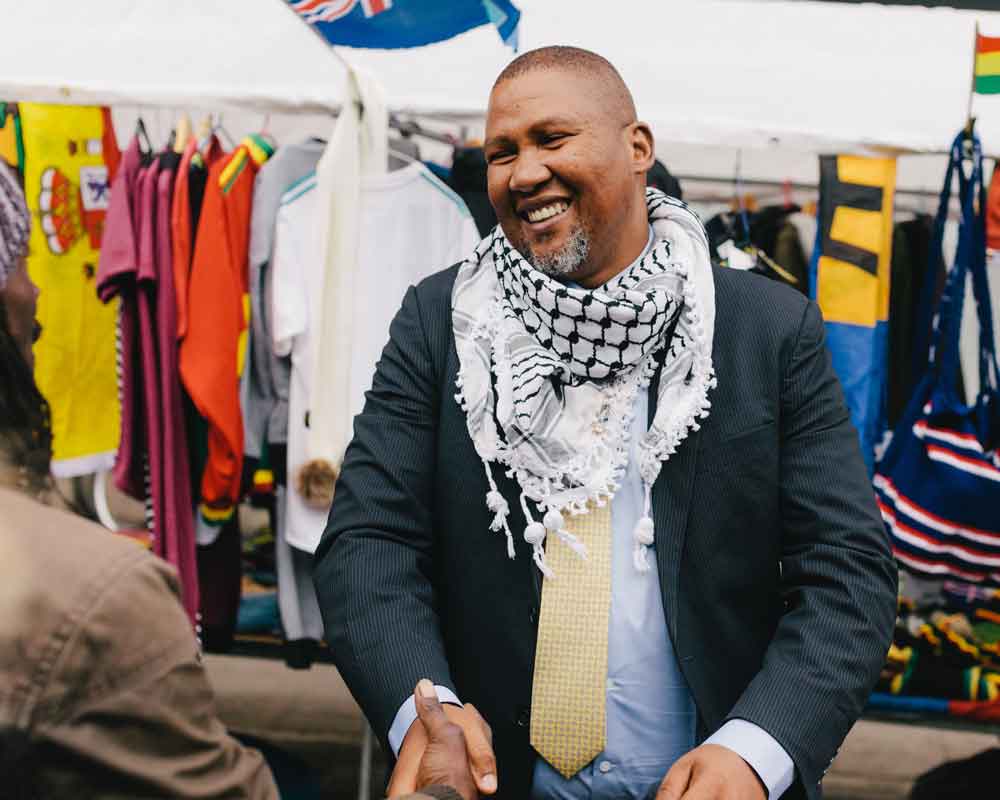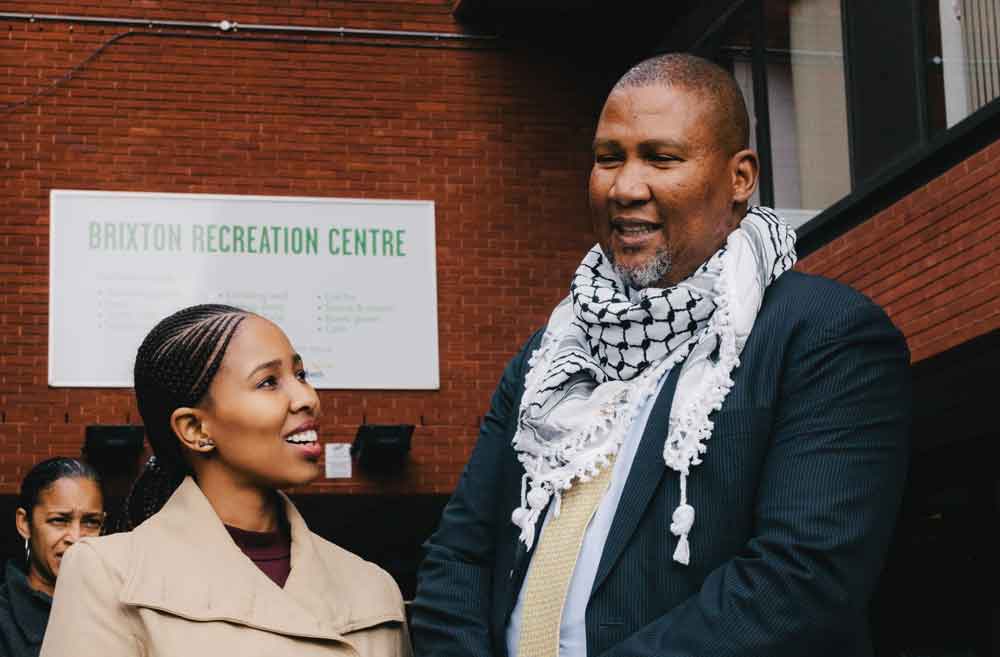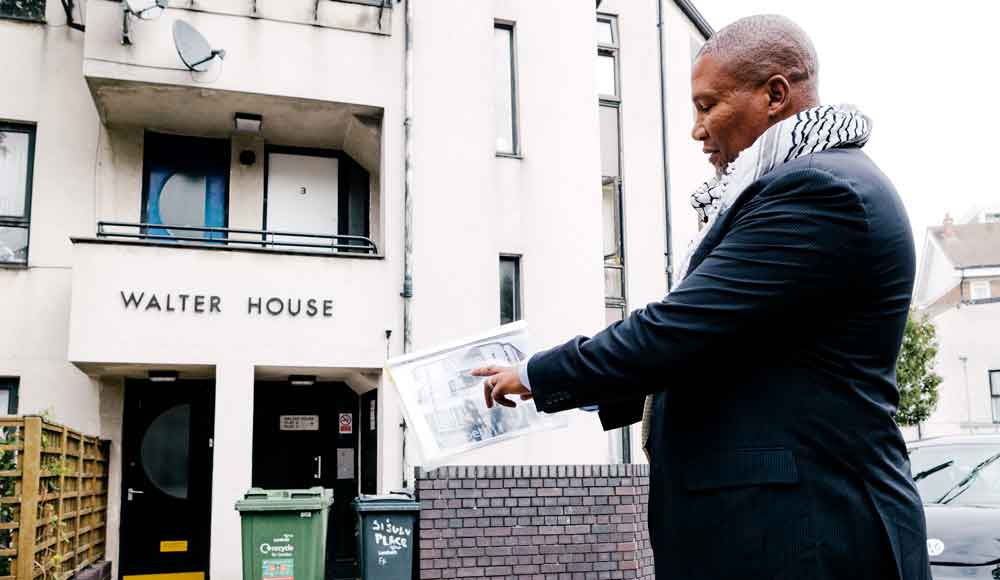A major exhibition celebrating the life and legacy of Nelson Mandela, former South African President and icon of the anti-apartheid struggle, opens in London next February. His grandson Nkosi Zwelivelile Mandela was in London to promote the exhibition. Dave Randall caught up with him in Brixton.

It’s 11am on a Monday morning and I’m standing outside Brixton Tube with local historian Kelly Foster, several journalists and photographers, and the grandson of Nelson Mandela.
Nkosi Zwelivelile Mandela, or “Chief Mandela”, as he is usually referred to, appears to be everything you might hope for in a man of his provenance. He is tall and dignified but also warm and approachable, dressed in a dark suit with a Palestinian keffiyeh wrapped around his neck. We are setting out on a tour of the Brixton places, streets and statues commemorating the anti-apartheid struggle.
Kelly begins by pointing out the new mural at the entrance to the tube, Remain, Thrivingby artist Njideka Akunyili Crosby, noting the local celebrities depicted in the background collage, such as Linton Kwesi Johnson, who took part in the anti-apartheid struggle in the UK.

Chief Mandela notices the “Windrush Scandal” caption on the television screen in the mural and asks what it refers to. Since our government is on topic, I ask the Chief what he makes of our current Prime Minister and leader of the opposition.
“Let me begin by saying that it was hilarious but also a saddening moment for us as South Africans to have Prime Minister Theresa May come to South Africa and go to Robben Island … The British government did nothing for the liberation of South Africa. Yet the British citizenry did a lot, particularly in the Anti-Apartheid campaign.
“People like Jeremy Corbyn were right at the forefront of that. We applaud them, and we continue to pledge our support to them.”
We pause at the Brixton Academy where we are shown a picture of Winnie Mandela onstage at a “Dance Mandela” concert in 1990. Then we cross Brixton Road and stroll to the statue in the corner of Max Roach park commemorating the Soweto Uprising of 1976.
The Chief asks whether other national liberation struggles are currently supported by Londoners, giving the examples of Palestine and Western Sahara. “I’ve always insisted, after my visit to occupied Palestine … what the Palestinians are witnessing is the worst kind of apartheid ever seen.”

Images: ©Tomas Turpie
Kelly is an excellent guide and confidently fields the various questions, most of them asked by the Chief himself. Next we pass through Sisulu Place, named after leading African National Congress (ANC) activists Walter and Albertina Sisulu, before making our way to the venue that hosted Nelson Mandela’s visit in 1996 – the Brixton Recreation Centre.
It’s the detail in Kelly’s commentary that brings the history alive, such as her recollection that the vast crowds gathered outside the Rec spontaneously broke into a rendition of Bob Marley’s “We Don’t Wanna Wait In Vain For Your Love”, in a (successful) attempt to coax Madiba out of the building and on to the steps where he could be seen.
Our tour finished in Windrush Square at the monument commemorating lives lost in the Sharpeville Massacre of 1960, when South African police opened fire on a demonstration against pass laws, killing 69 people.
After some lunch at the Black Cultural Archive, Chief Mandela took questions including one about the ANC’s current leader President Cyril Ramaphosa. The Chief was reminded that Ramaphosa sat on the board of the mining company Lonmin in 2012 when miners in the municipality of Marikana went on strike to protest appalling pay and conditions.
Rather than calling for negotiations, Ramaphosa instead described the strikers as “dastardly criminals” and demanded “concomitant action” from the police who duly moved in. Thirty four miners were massacred. For the first time all day, Chief Mandela seemed evasive, as he made a rather half-hearted defence of the current President.
Nelson Mandela saw the success of the ANC as one of his most important legacies. Whether the party still offers hope to the poor masses of South Africa is likely to be sharply debated in the lead up to the country’s next general election in 2019.
Londoners can at least look forward to a major celebration of the life of the man who first led them to power.
Mandela: The Official Exhibition opens on 8 February at 26 Leake Street, near Waterloo Station. Adult tickets are from £14.50 to 17.50 each. Under-12 and over-65 tickets are £15.50 each.
%CODE1_RES_610%
Nelson Mandela’s visit to Brixton in 1996.



